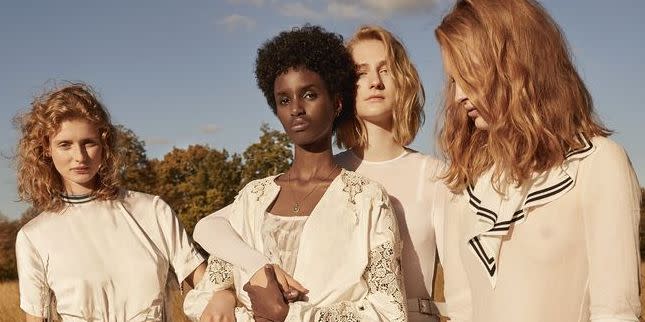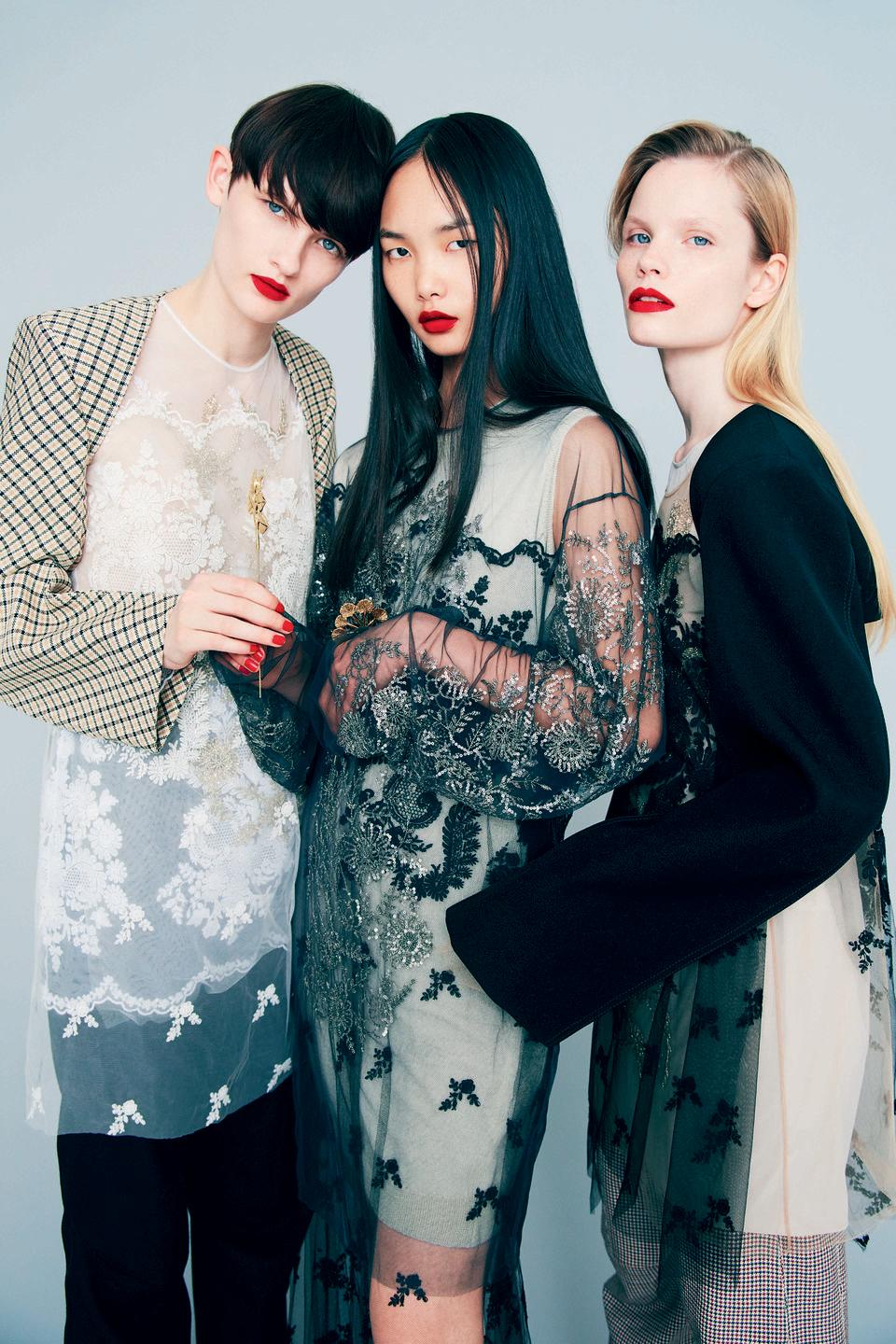What beauty really needs: 5 predictions for the industry in 2021

Twelve months ago, few of us would have predicted that the trends to dominate the year ahead would be tracksuits, banana bread and face masks (of both kinds). Now, as we head tentatively into 2021, inspiration remains elusive. Where usually we’d be looking to the months ahead, hailing the return of the cat eye or a pink lip, fleeting trends feel out of place this January.
But with this change in mindset comes hope. A more positive agenda is on the horizon, as we step off the treadmill of self-improvement and replace optimisation with acceptance, transience with transformation. As beauty standards disseminate, creativity can come to the fore, opening up the floor to the joy-inducing powers of beauty, as it should be.
Below, industry experts discuss their predictions for beauty in 2021...
1/ Digital dermatology
Client-facing industries have been forced to innovate in the past year, with everyone from make-up artists to skin specialists shifting into the online space. One aspect that looks set to stay is the rise of digital dermatology.
“Starting this year in lockdown again means we are still going to be heavily reliant on video platforms like Zoom for work and play,” says Dr. Anjali Mahto. “This means that we are constantly exposed to our own reflection for prolonged periods of time, and my fear is that it will lead to more fixation on perceived skin problems. Working from home, reduced social interaction and financial worries can also contribute to our general stress, which can further play into worsening of pre-existing skin conditions or triggering them for the first time."
Mahto believes that online dermatology makes sense both now, and in a post-pandemic world. "Seeing a professional from the comfort of your home has many benefits: your skincare products are to-hand, you don't need to fear being seen without make-up in public, and lockdown provides a perfect time to focus on sorting out long-standing skin issues such as acne and rosacea in both the short and long-term. There is time to be at home and adjust to new skincare routines or medications if needed,” says Dr Anjali Mahto.
Get Harley is offering one-to-one digital dermatology consultations with its expert practitioners, after which you can choose to purchase your personally curated product prescription. New skincare innovators Skin+Me and Dermatica both offer custom-blended skin prescriptions following an online dermatologist assessment. With prices starting at just £19.99 per month, they’re a much more affordable alternative to an in-person appointment and offer access to some excellent ingredients that would otherwise be off-limits.
If you prefer the ease of ordering a ready-made routine, skin-health specialist Dija Ayodele will be launching her Skin Heroes boxes later this month. Designed with darker skin tones in mind, these targeted regimes for dry, combination, or oily skin contain products from in-clinic brands such as Exuvience, Neostrata and Osmosis, and are designed to offer an easy yet highly effective treatment solution.
With hot-weather holidays currently on pause, now is the ideal time to invest in prescription-strength actives, be it retinol or acids, that will nix any niggling conditions, ready for the arrival of spring and the freedom that's on the horizon.
2/ The broadening of beauty standards
Acne positivity marched into the mainstream last year, thanks to a new wave of social-media influencers revealing the reality of skin in all its changing, reactionary, pore-strewn glory. Industry experts followed suit, showing the less-glamorous side of skincare with a science-first approach.
Ultimately, this stronger sense of skin acceptance signals the weakening of long-entrenched beauty ideals. It’s time to embrace a broader spectrum of beauty standards: in fact, it’s time to stop setting ‘standards’ at all. What we really need instead is a wider understanding of ‘beauty’, which of course goes hand-in-hand with better diversity and representation.

"There’s definitely been a huge shift within the industry over the last six months", says Sasha Louise Pallari, a make-up artist and figurehead for the fight against social media’s homogenised beauty standards. “I really hope it’s here to stay and grow and not just because it’s a trend right now, but it’s definitely the first time I’ve been online and seen influencers stating ‘without a filter’ or at least acknowledging them more. It means we’re heading towards a much more transparent place online and the benefits of that for women and young girls' mental health will be prolific.”
Pallari hopes we’re heading towards a wider understanding of beauty. “I want us to be in a place where it’s all represented. The best moisturiser on the market shouldn’t only be advertised by a model with already perfect skin. Let’s see more pores, wrinkles, acne, and scarring. It would be amazing for this huge industry to explode even further because it’s finally including and representing everyone.”
Launched last week, Cult Beauty’s Up Close campaign - which features unfiltered skin of all types, tones and textures - hits just the right note. According to co-founder and co-CEO Alexia Inge, now is exactly the right time to shift the way we see skin. “Our recent and prolonged internment has changed our views on many things to do with self-image - nothing like facing death to make spots and body shape issues seem trivial,” she says. “Most people have spent lockdown wearing the make-up version of 'leisurewear', otherwise known as skincare; we’ve become used to seeing our faces without 'going out' levels of daily make-up and I think this has hastened a skin-ceptance movement that has been bubbling up in some beauty counter-cultures for a couple of years now.”
3/ The return of make-up rebellion
With beauty standards disassembled, the floor is open for true creativity. So, are we facing the end of the paint-by-numbers tutorial?
“I think we’ve reached a point where people are tiring of the standards created by the Insta-face phenomenon that pretty much dictated the last decade,” says Terry Barber, director of make-up artistry at MAC. “A generation of aspiring make-up artists used social media to show off their transformations but unfortunately it somehow became a standard. Not only does it involve rigid, largely unnecessary technique and more time-consuming layers than anyone would be bothered with in the real world, it also created an ideal; a level of so-called perfection (somewhere in between a contestant from Love island and a Disney princess) that many people just don’t aspire to.”
But with the breakdown of these boundaries, we can rediscover the joy of unrestricted make-up application, replacing tutorials with individual creativity, and begin to enjoy a new kind of beauty.
“What people who wear make-up are yearning for again are the nuances which became lost; effortlessness, cool, nonchalance and experimentation,” says Barber. “They are once more turning to the face they choose, not a generic one which is imposed by rules.”
4/ Simplified sustainability
It has never been more pressing for brands and consumers to consider sustainability, and 2021 looks set to be a year of promising progress. With 73 per cent of global millennials willing to spend more on products from a sustainable brand, demand – as well as urgency – is higher than ever.
At the end of 2020, the British Beauty Council released its first sustainability report. Commissioned by CEO Millie Kendall MBE and Pillar President for Innovation Anna Teal, the comprehensive study set an agenda for the industry to move forward with into 2021 and beyond.
If there’s one overarching theme that comes from the report, it's one of consumer confusion. One in five don’t know how to check a product’s sustainability credentials, and one in three don’t understand the ingredients in their products. In 2021 it seems, clarity is crucial.
“We must work together to make this change and we must work with the urgency that the situation demands. We know now that extraordinary change can happen fast. It will take commitment, courage and collaboration if we are to reach our highest goals,” said Kendall and Teal.

Of course, the most sustainable move you can make is to simply consume less (hence the end of the skincare ‘haul’), but there are brands making strides in specific areas.
According to Zero Waste Week, more than 120 billion units of packaging are produced globally every year by the cosmetics industry, making refillables a strong (if not perfect - refills still require some packaging) start. Here, look to Medik8, Charlotte Tilbury, La Bouche Rouge, Kjaer Weis, Dior and Faith in Nature.
Aveda has just announced its transition to an all-vegan line-up, while Garnier will soon allow consumers to access sustainability scores for every single product in its roster – including the new cardboard-wrapped, 97 per cent biodegradable solid shampoo bars.
The Body Shop and Lush have both long been investing in the welfare of the farmers they employ, while REN’s sustainability strategy truly moves the needle, not only offering scrupulously sustainable products (housed in reclaimed ocean plastic) but actively partnering with pollution-fighting charities and funding the Infinity Recycling innovation, whereby plastic can be recycled without limits. By the end of 2021, the brand is aiming to be entirely zero waste: no easy challenge, but one truly worth supporting.
5/ True inclusivity
2020 was the year that ‘performative activism’ hit our lexicon, and 2021 will be the time for brands to be counted.
A make-up shade extension is progress, but darker shades shouldn’t be a bolt-on. In 2021, any new brand should be launching with an inclusive spectrum, and major retailers should be clearing shelf space for Black-owned businesses (as UOMA Beauty founder Sharon Chuter's #PullUpOrShutUp campaign demands).
Candour Beauty will be one to watch: the newly launched site offers a broad curation of products from Black-owned businesses, with content written by experts who truly understand the lines, as well as the skin they are intended to treat.
“Since the launch of multi-million brands such as Fenty Beauty, retailers are realising that there is a need for change to meet consumer needs,” says Abi Lawrence-Adesida, co-founder of Candour Beauty. “Black Lives Matter being the catalyst for change has seen a response not only from mainstream retailers and brand owners but we've also seen a rise in the number of beauty brands launched by people of colour in recent months. We welcome these changes and think the drive towards inclusivity will continue through 2021 and beyond. Not as a token approach but as something so intrinsic to a brand’s ethos that it doesn’t need mentioning."
‘We've already seen a number of brands partner with Black influencers on a higher scale and I believe this will continue for the year ahead. Mainstream hair care brands may take a while to introduce more diverse offerings to their lines for afro textured hair, so retailers will likely source brands that specifically target this audience”, adds co-founder Jacqueline Kusamotu.
You Might Also Like


